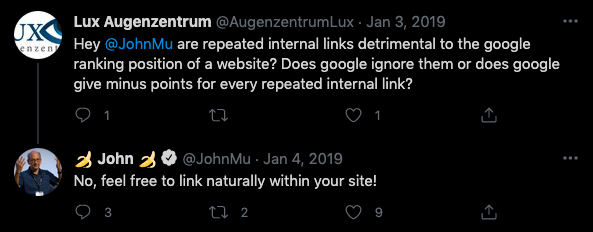Subscribe now and get the latest podcast releases delivered straight to your inbox.
Too many internal links in content can confuse Google about site structure

By Liz Murphy
Jul 9, 2021

Internal links in content, the short version
- Who is impacted by this: If you're creating content to drive traffic, leads, and sales, and/or leveraging a robust pillar content strategy to increase your search rankings – which *checks notes* is all of you – you'll want to pay attention to this newsy little tidbit.
- What's the deal: Google's John Mueller recently shared that too many internal links on pages can confuse the search engine when it comes to understanding your website's structure, what pages are important, what your site is about, and so on. These are all important factors in how Google ranks content in search.
- LOL, of course: I can hear Kevin Church (our director of SEO) laughing in the distance because this is seemingly in conflict with what Mueller said on this topic before. Two years ago, Mueller replied to someone on Twitter who was worried about internal-linking density in content hurting their rankings with: "... feel free to link naturally within your site!" But this may not be the contradiction it seems.
OK, are you ready to understand what the heck this means for you? I bet you are!
Why does site structure matter to Google?
"Liz, do we really need to care about all of this technical stuff like site structure and whatever?"
If you are creating content as part of an inbound marketing strategy to drive more sales for your company, then yes, this stuff matters to you. What we're talking about today is all about how Google decides whether or not your content shows up at the top of search results for your ideal buyers.
Now, let's dig in.
Google's goal has been, and always will be, to serve up the most relevant results to their searchers (including your target audience) as quickly as possible. And, over the past 10 years especially, they've made significant strides in doing so.
🍿 IMPACT+ on-demand: Most costly lies you believe about your website
You see, many, many moons ago, Google's way of indexing content and ranking it in search results was a bit more rudimentary and very literal, which got in the way of this goal.
For example:
- If you loaded up a website page with the right keywords (called keyword stuffing on the aggressive end of the spectrum), you could bring your website page to the top of search results, no matter how spammy or irrelevant it was.
- While humans natively understood the link between related terms and concepts (e.g., "cars" and "automobiles"), Google couldn't really do the same. This presented challenges in really understanding the intent behind searches and the substance of website pages.
Of course, these aggressions could not stand, man. So, in 2011 with its Panda update, Google implemented quality scoring for website pages to target keyword stuffers.
Then, in 2013, Google rolled out its Hummingbird update. Its goal was to move away from the old-school way of hyper-focusing on keywords and embrace what we now call semantic search, wherein Google does a better job of understanding intent, context, and (most of all) the relationships between words.
Two years later, Google confirmed the existence of something called RankBrain. Unlike previous iterations of their core algorithm, RankBrain was an AI-based, machine-learning powerhouse for mapping content on the internet and ranking it in search results.
And this is where the importance of your site structure comes into play with search rankings.
The summation of these three critical updates (plus many others that have occurred along the way) has become much more concerned with what your website is really about at a high level rather than the strength of optimization on a single website page.
To figure out what your business website is about – as it assesses how to rank your educational content – Google's AI-powered algorithm looks at your site structure.
That's why pillar content became such a big deal for companies using inbound marketing to drive sales. Instead of executing a content strategy that is simply an endless number of blog articles targeting an arbitrary list of keywords, a pillar content approach empowers publishers (just like you) to organize your content in such a way that what you want to be an authority on is clear to Google.
🔎 Related resources:
- IMPACT+ course: Creating pillar content buyers and search engines love
- IMPACT+ course: Investing in your business website's user experience
- IMPACT+ course: On-page SEO and the user experience
I know, this was a long-winded explanation as to why this news matters. But you need to have this level of basic SEO literacy to understand some of the larger forces at play that dictate (in big ways) how well your content does or doesn't rank. And your site's architecture, as well as how clearly your content is organized, are much more important than they used to be.
How do internal links hurt or help site structure?
Robots aside, internal links (when leveraged correctly and strategically) are a great way to help your ideal buyers discover more relevant content that is related to their interests.
🔎 Related: The Big 5 best business blog topics to drive traffic, leads and sales
But yes, internal links matter a lot to the robots. In fact, Google likes internal links a lot. They help Google understand what pages are the most important on your website, as well as how your website is structured.
And now we know that there is such a thing as going too far with internal linking, as Mueller explained recently:
"I think, in the sense that we do use the internal links to better understand the structure of a page, and you can imagine the situation where if we’re trying to understand the structure of a website, with the different pages that are out there, if all pages are linked to all other pages on the website, where you essentially have like a complete internal linking across every single page, then there’s no real structure there.
"It’s like this one giant mass of pages for this website, and they’re all interlinked, we can’t figure out which one is the most important one. We can’t figure out which one of these are related to each other. And in a case like that, having all of those internal links, that’s not really doing your site that much."
In true Google fashion, of course, there's a digital paper trail of somewhat conflicting answers:
To be blunt, Google contradicting itself is not completely uncommon. Although, I'm sure they would argue that (in essence) the answers he gave both now and back in 2019 are not actually mutually exclusive.
Across a wide range of topics, Google has always said that if you're more focused on creating high-quality content that's published on a website with an outstanding page experience for website visitors, instead of trying to game the system, you'll be OK.
So, his 2019 comment of linking "naturally" still makes sense in the context of his 2021 answer. If you go too far overboard with internal linking to the point of creating confusion, you're likely focusing on linking as more of a strategy to boost rankings rather than targeting your internal linking strategy where it makes the most sense.
What does this all mean of your website?
Once upon a time, to get your content to rank well so it would be found by your ideal buyers meant creating content and optimizing website pages around the right keywords you wanted to own.
Today, that's still true to some degree. However, how well your website does or doesn't rank now has so much more to do with "bigger picture" issues like site structure (as we talked about in this story), and page experience (which we've talked about at length before).
So, while it's easy to dismiss these little morsels of strategic SEO expertise as being "too in the weeds" to be relevant to how well your content strategy gets results, you shouldn't. You need to recognize that the overall health, structure and experience of your website matters more than ever to your success and your ability to rank No. 1 for the keywords you desire most.
Free: Assessment
